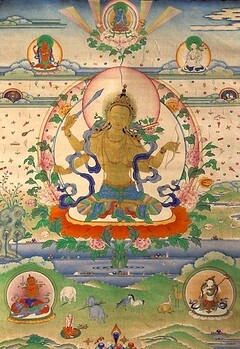Five Families of Mañjuśrī Praise
༄༅། །འཇམ་དཔལ་རིགས་ལྔར་བསྟོད་གསོལ་བཞུགས། །
Praise and Prayer to the Five Families of Mañjuśrī
by Jamyang Khyentse Chökyi Lodrö
ཨོཾ་ཝཱ་ཀྱེ་དཾ་ན་མཿ
om wakyédam namah
oṃ vākyedaṃ namaḥ
སངས་རྒྱས་ཀུན་གྱི་སྐུ་ཆེན་པོ། །
sangye kün gyi ku chenpo
Great body of all the buddhas,
ཡེ་ཤེས་སྐུ་སྟེ་སྐུའི་དབང་ཕྱུག །
yeshe ku té kü wangchuk
Wisdom body, sovereign body,
འཇམ་དཔལ་དྲི་མ་མེད་པའི་སྐུ། །
jampal drima mepé ku
Mañjuśrī, immaculate in form,
མཆོག་སྦྱིན་རྡོ་རྗེར་ཕྱག་འཚལ་བསྟོད།
chok jin dorjér chaktsal tö
Vajra granter of boons, to you I offer homage and praise.
ཨོཾ་ཝཱ་གཱི་ཤྭ་རི་མུྃ།
om wagi shvari mum
oṃ vāgiśvara muṃ
བདག་མེད་སེངྒེའི་སྒྲ་དང་ལྡན། །
dakmé sengé dra dangden
Striking fear into deer-like heretics
མུ་སྟེགས་རི་དྭགས་ངན་འཇིགས་པ། །
mutek ridak ngen jikpa
With the lion’s roar of selflessness.1
ཀུན་ཏུ་འགྲོ་བའི་དོན་སྟོན་པའི། །
küntu drowé dön tönpé
You reveal the universal meaning,
གསུང་གི་དབང་ཕྱུག་ཕྱག་འཚལ་བསྟོད། །
sung gi wangchuk chaktsal tö
Master of speech, to you I offer homage and praise.
ཨོཾ་ཨ་ར་པ་ཙ་ན་དྷཱིཿ
om arapatsana dhih
oṃ arapacana dhīḥ
འགྲོ་བའི་མར་མེ་ཡེ་ཤེས་སྒྲོན། །
drowé marmé yeshe drön
A light for beings, a lantern unto wisdom,
གཟི་བརྗིད་ཆེན་པོ་འོད་གསལ་བ། །
ziji chenpo ösalwa
With energy supreme, most radiant,2
ཀུན་ཏུ་རྟོག་པ་ཐམས་ཅད་སྤངས། །
küntu tokpa tamché pang
Entirely free from any form of concept.3
འཇམ་དཔལ་རྡོ་རྗེར་ཕྱག་འཚལ་བསྟོད། །
jampal dorjér chaktsal tö
Mañjuvajra, to you I offer homage and praise.
ཨོཾ་བཛྲ་ཏིཀྵ་ཎ་དུཿཁ་ཙྪེ་ད་པྲ་ཛྙཱ་ཛྙཱ་ན་མུརྟྟ་ཡེ། ཛྙཱ་ན་ཀཱ་ཡ་ཝཱ་གཱི་ཤྭ་ར་ཨ་ར་པ་ཙ་ནཱ་ཡ་ཏེ་ན་མཿ
om benza tikshana duhkha tséda prajna jnana murtta yé jnana kaya wagi shara arapatsana ya té namah
oṃ vajratīkṣṇa duḥkha chheda prajñā jñāna mūrtaye | jñāna-kāya-vāgiśvara arapacanāyate namaḥ
དོན་གསུམ་ཐེ་ཚོམ་གཅོད་པའི་བློ། །
dön sum tetsom chöpé lo
His thinking free from doubt, his object threefold,
ཀུན་དོན་ཡོན་ཏན་གསུམ་གྱི་བདག །
kün dön yönten sum gyi dak
His object all, three properties by nature.4
སངས་རྒྱས་བྱང་ཆུབ་བླ་ན་མེད། །
sangye changchub lanamé
The buddha’s unsurpassed awakening,5
ཡོན་ཏན་མཐའ་ཡས་ཕྱག་འཚལ་བསྟོད། །
yönten tayé chaktsal tö
Limitless Qualities, to you I offer homage and praise.
ཨོཾ་ཧྲཱིཿདྷཱིཿམ་མེ་དཱི་པཾ་མཉྫུ་ཤྲཱི་མུྃ་ཧྲཱིཿཔྲཛྙཱ་ཝཱརྡྷ་ནི་ཧྲཱིཿདྷཱིཿསྭཱ་ཧཱ།
om hrih dhih mamé dipam mandzushri mum hrih pradznya wardhani hrih dhih soha
oṃ hrīḥ mame dīpaṃ mañjuśrī mūṃ hrīḥ prajñā vardhani hrīḥ dhīḥ svāhā
སྨྲ་བའི་སེངྒེ་ཚུགས་པ་མེད། །
mawé sengé tsukpamé
The unassailable, the lion of speech,6
ཀུན་ཏུ་བལྟ་བས་མཆོག་ཏུ་དགའ། །
küntu tawé chok tu ga
With universal vision, true delight,
གཟི་བརྗིད་ཕྲེང་བ་ལྟ་ན་སྡུག །
ziji trengwa ta na duk
With fire garlands, handsome to behold,7
ཆོས་ཀྱི་རྒྱལ་མཚན་ཕྱག་འཚལ་བསྟོད།
chö kyi gyaltsen chaktsal tö
Dharma Banner of Victory, to you I offer homage and praise.
ཨོཾ་མཉྫུ་ཤྲཱི་ཛྙཱ་ན་ས་ཏྭ་ཧཱུྃ། །
om mandzushri jnana sata hung
oṃ mañjuśrī-jñāna-satva-hūṃ
དང་པོའི་སངས་རྒྱས་རྒྱུ་མེད་པ། །
dangpö sangye gyu mepa
Primordial buddha, who’s devoid of any cause,
ཡེ་ཤེས་མིག་གཅིག་དྲི་མ་མེད། །
yeshe mik chik drima mé
With wisdom as his only eye, unstained,
ཡེ་ཤེས་ལུས་ཅན་དེ་བཞིན་གཤེགས། །
yeshe lüchen dezhin shek
Tathāgata, with wisdom as his body,8
དཀྱིལ་འཁོར་དབང་ཕྱུག་ཕྱག་འཚལ་བསྟོད། །
kyilkhor wangchuk chaktsal tö
Lord of the maṇḍala, to you I offer homage and praise.
འཇམ་དཔལ་རིགས་ལྔའི་ལྷ་ཚོགས་ལ། །
jampal rik ngé lhatsok la
Through the merit of paying homage and praising
ཕྱག་འཚལ་བསྟོད་པའི་བསོད་ནམས་ཀྱིས། །
chaktsal töpé sönam kyi
The hosts of deities of the five families of Mañjuśrī,
མ་རིག་མུན་པ་ཀུན་སེལ་ནས། །
marik münpa kün sel né
May the darkness of ignorance be entirely dispelled
མཁྱེན་གཉིས་སྣང་བ་རྒྱས་པར་ཤོག །
khyen nyinang ba gyepar shok
And the light of twofold knowledge always shine.
རྒྱུད་ཀྱི་ངེས་པའི་བསྟོད་པ་འདི། །
ཆོས་ཀྱི་བློ་གྲོས་ཞེས་བྱ་བར། །
ལྷ་རྫས་ཡོལ་གོའི་རྟེན་དང་བཅས། །
ཨ་མདོ་བླ་མས་བསྐུལ་ངོར་བྲིས། །
This praise based on the definitive tantra
Was written by one called Chökyi Lodrö,
In response to a request from Amdo Lama,
Accompanied by a silken scarf and vessel.
ཤུ་བྷཾ། ། །།
Śubham.
| Translated by Adam Pearcey with reference to the Chanting the Names of Mañjuśrī (Mañjuśrī-nāma-saṅgīti) translation by Ryan Conlon and Stefan Mang and with the generous support of the Khyentse Foundation and Tertön Sogyal Trust, 2022.
Source:
'Jam dbyangs chos kyi blo gros. "jam dpal rigs lngar bstod gsol/" in 'Jam dbyangs chos kyi blo gros kyi gsung 'bum. 12 vols. Bir, H.P.: Khyentse Labrang, 2012. (BDRC W1KG12986). Vol. 2: 385–386
Version: 1.1-20250307
- ↑ These two lines are from Mañjuśrī-nāma-saṅgīti 47. See https://www.lotsawahouse.org/words-of-the-buddha/chanting-names-of-manjushri
- ↑ These two lines are from Mañjuśrī-nāma-saṅgīti 62.
- ↑ This line is from Mañjuśrī-nāma-saṅgīti 56
- ↑ From Mañjuśrī-nāma-saṅgīti 140
- ↑ From Mañjuśrī-nāma-saṅgīti 143
- ↑ From Mañjuśrī-nāma-saṅgīti 101
- ↑ From Mañjuśrī-nāma-saṅgīti 102
- ↑ From Mañjuśrī-nāma-saṅgīti 100
